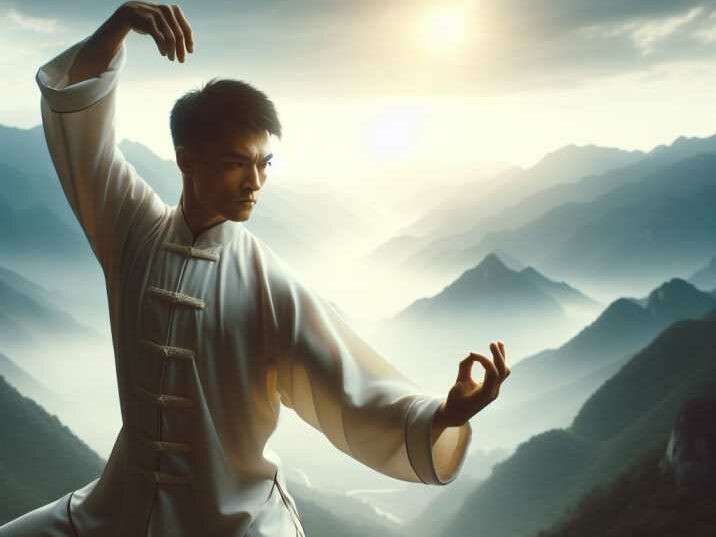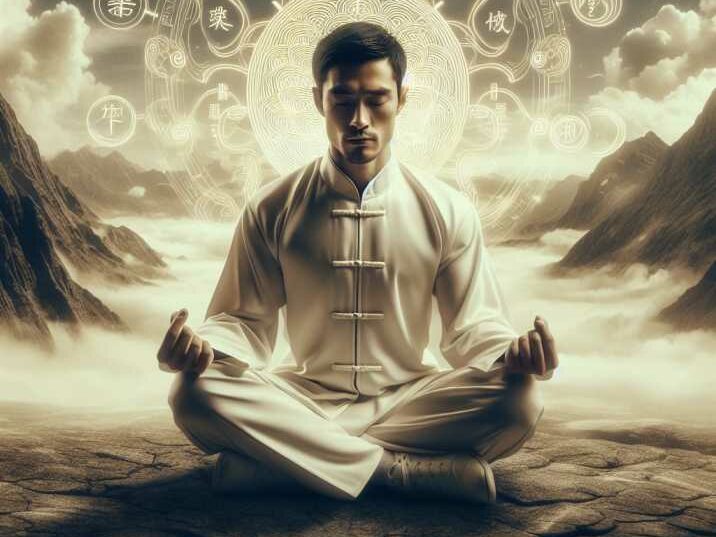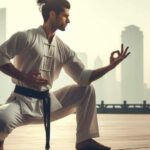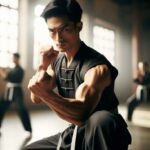Introduction:
Table of Contents
Kung Fu, an ancient Chinese martial art, encompasses a holistic approach to combat, focusing not only on physical techniques but also on mental and spiritual aspects. At the core of Kung Fu lies the concept of Qi, often referred to as life energy or vital force. In this comprehensive guide, we will delve into the intricate role of Qi (Energy) in Kung Fu, exploring its significance across various subtopics.

The Role of Qi (Energy) in Kung Fu
Understanding Qi in Traditional Chinese Medicine (TCM):
- Qi is a fundamental concept in Traditional Chinese Medicine, representing the vital energy that flows through the body.
- According to TCM, Qi is responsible for maintaining health and vitality, and its balance is crucial for overall well-being.
- Practices such as acupuncture, Qigong, and Tai Chi aim to regulate the flow of Qi in the body to promote health and healing.
Qi in Kung Fu Philosophy:
- In Kung Fu philosophy, Qi is seen as the foundation of martial arts prowess, enabling practitioners to harness inner strength and external power.
- The cultivation and manipulation of Qi are central to achieving mastery in Kung Fu, as it enhances physical performance and mental focus.
- Qi is believed to flow along specific pathways called meridians, and Kung Fu training aims to optimize this flow for maximum effectiveness in combat.
Harnessing Qi for Physical Performance:
- Kung Fu training involves various exercises and forms designed to cultivate and channel Qi for enhanced physical performance.
- Practitioners focus on breathing techniques, known as “Qigong,” to regulate Qi flow and increase stamina and endurance.
- Qi is utilized to generate power in strikes, blocks, and other martial arts techniques, allowing practitioners to exert maximum force with minimal effort.
Mental Focus and Qi:
- Qi is closely linked to mental focus and concentration in Kung Fu practice.
- Through meditation and mindfulness exercises, practitioners learn to harness Qi to calm the mind, maintain focus during combat, and anticipate opponents’ movements.
- Cultivating a strong connection between mind and Qi enables practitioners to execute techniques with precision and efficiency.

Spiritual Development through Qi:
- Beyond physical prowess, Kung Fu emphasizes spiritual growth and self-cultivation.
- Qi cultivation is integral to spiritual development in Kung Fu, fostering qualities such as inner peace, harmony, and mindfulness.
- By aligning body, mind, and Qi, practitioners embark on a journey of self-discovery and personal transformation.
Qi and Healing in Kung Fu:
- In addition, the role of Qi (energy) in kung fu training is also utilized for healing purposes.
- Internal martial arts styles, such as Tai Chi and Baguazhang, focus on gentle, flowing movements that promote Qi circulation and support the body’s natural healing processes.
- Through regular practice, Kung Fu practitioners experience improved health, reduced stress, and enhanced vitality attributed to balanced Qi flow.
Tabe of Information Role of Qi (Energy) in Kung Fu
| Subtopic | Details |
|---|---|
| Understanding Qi in TCM | Qi is the vital energy in Traditional Chinese Medicine (TCM) |
| It flows through meridians, influencing health and vitality | |
| Qi in Kung Fu Philosophy | Qi is the foundation of martial arts prowess |
| It enables practitioners to harness inner strength and external power | |
| Harnessing Qi for Physical Performance | Kung Fu training involves exercises to cultivate and channel Qi |
| Breathing techniques (Qigong) are used to regulate Qi flow and increase stamina and endurance | |
| Mental Focus and Qi | Qi is closely linked to mental focus and concentration |
| – Meditation and mindfulness exercises help practitioners harness Qi to calm the mind and anticipate opponents’ movements | |
| Spiritual Development through Qi | Qi cultivation fosters inner peace, harmony, and mindfulness |
| Aligning body, mind, and Qi leads to self-discovery and personal transformation | |
| Qi and Healing in Kung Fu | Internal martial arts styles promote Qi circulation for healing |
| Tai Chi and Baguazhang emphasize gentle, flowing movements to support the body’s natural healing processes |
Conclusion:
In conclusion,Role of Qi (energy) in Kung Fu plays a multifaceted, encompassing physical, mental, and spiritual dimensions. From its roots in Traditional Chinese Medicine to its application in combat and healing, Qi is the lifeblood of this ancient martial art form. By understanding and harnessing the power of Qi, practitioners not only enhance their martial skills but also embark on a journey of self-discovery and personal growth within the realm of Kung Fu.
FAQs
- What is Role of Qi (energy) in Kung Fu, and how does it differ from Western concepts of energy?
- Qi in Kung Fu is a concept rooted in Traditional Chinese Medicine and philosophy, representing the vital energy that flows through the body. It differs from Western concepts of energy as it encompasses both physical and metaphysical aspects, including breath, vitality, and life force. In Kung Fu, Qi is believed to be manipulated through specific practices to enhance physical performance, mental focus, and spiritual growth.
- How do Kung Fu practitioners cultivate Qi?
- Kung Fu practitioners cultivate Qi through various exercises and techniques aimed at regulating its flow within the body. This includes Qigong exercises focused on breath control and meditation, forms practice that integrates movement with breath, and specific martial arts techniques designed to harness Qi for combat effectiveness. Consistent training and mindfulness practices help practitioners develop a strong connection with their Qi, enabling them to utilize it effectively in their martial arts practice.
- What role does Qi play in combat and martial arts techniques?
- Qi plays a crucial role in combat and martial arts techniques by providing practitioners with enhanced physical power, speed, and endurance. Through proper Qi cultivation and application, practitioners can execute techniques with precision, efficiency, and minimal effort. Qi also contributes to mental focus and awareness during combat, allowing practitioners to anticipate and respond to opponents’ movements effectively.
- Can Qi be used for healing purposes in Kung Fu?
- Yes, Qi is often utilized for healing purposes in Kung Fu, particularly in internal martial arts styles such as Tai Chi and Baguazhang. These styles emphasize gentle, flowing movements that promote Qi circulation throughout the body, supporting natural healing processes. Regular practice of these forms is believed to improve overall health, reduce stress, and enhance vitality by balancing Qi flow and harmonizing body, mind, and spirit.
- Is there scientific evidence to support the concept of Qi in Kung Fu?
- While the concept of Qi in Kung Fu is rooted in ancient Chinese philosophy and Traditional Chinese Medicine, scientific evidence regarding its existence and effects is limited and often debated. Some studies have explored the physiological and psychological benefits of practices associated with Qi cultivation, such as meditation and breath control. However, further research is needed to fully understand the mechanisms underlying the concept of Qi and its role in martial arts practice.


